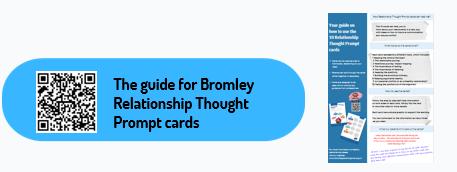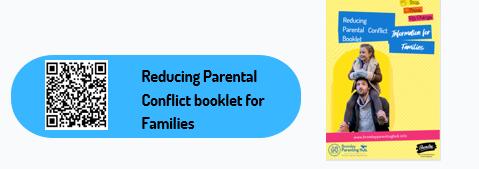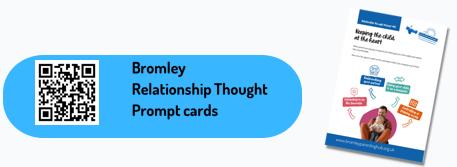
Distinguishing harmful Parental Conflict (PC) and Domestic Abuse (DA) screening tool
Guidance on how to use the screening tool.
By having conversations about relationships, professionals are better placed to identify both PC and DA The below checklist should be used as part of the process of discussing relationships. Following the three-step healthy relationship model: STOP. THINK. CHANGE. The screening tool can be introduced when discussing signs of healthy relationships affected by conflict (PC) via signs of unhealthy relationships (DA)
The priority should be managing the potential risk of harm, so it is important to rule out DA before commencing PC work. The controlling and oppressive nature of DA means that we could cause survivors harm if we begin PC work without first ruling out DA
The tool has a range of questions about relationships, please be aware that some questions might arouse feelings of being overwhelmed or frightened and needs appropriate response from a professional.
DA and harmful PC are distinct from one another and require a different intervention technique. This screening tool is not designed to be a diagnostic tool and does not replace professional judgment. The results from the checklist are not an assessment of risk. They should provide you with a structure to inform your judgement and act as prompts to further questioning, analysis and risk management.
Where cases contain characteristics of both DA and PC, it is strongly advised to proceed to address DA first, as this will ensure you are able to explore the pattern of behaviours in the safest context.
If any of the below DA indicators are occurring, including coercive control, local policies, and procedures to address domestic abuse should always be followed, including completing a DASH risk assessment. For more information please visit: www.bromley.gov.uk/domesticabuse
Our local DA specialist is Bromley and Croydon Women’s Aid (BCWA) contact number: 020 83139303 www.bcwa.org.uk.
If someone is in immediate danger, please call 999.
If you have any concerns about a child’s safety, please contact:
• Children’s services (Mon-Fri, 8:30am-5pm): 020 8461 7373 / 7379
• Out of hours/weekends/public holidays: 0300 303 8671
• Email Bromley Children and Families Hub (C&F Hub) mash@bromley.gov.uk



Indicators of harmful parental conflict
If harmful conflict occurs, the following indicators are included but are not limited to:
I have experienced a high degree of anger or mistrust.
I have experienced some incidents of verbal conflict (shouting).
I feel frustrated with my partner.
I feel like my partner does not show interest in me.
I feel like my partner does not listen to me.
My partner gives me the silent treatment.
My partner or I do not know how to compromise.
I feel like my partner always brings up “past issues”.
We are stressed about the housing situation (not enough space, bad conditions, expensive bills or rent).
We argue a lot about alcohol misuse or other substance misuse.
My partner badmouths me in front of our child; friends; or relatives.
We argue about childcare arrangements between us.
My partner or I control access to spending time with the child.
I’m struggling to understand my partner’s feelings and thoughts.
I feel angry and upset about how we share housework.
We are stressed about our child’s additional needs and/ or challenging behaviour.
My partner and I disagree about discipline and how to parent the kids.
We argue about money and how to spend it wisely.
I disagree about his or her work arrangements or workload.
Parental Conflict can escalate into incidents of violence or physical aggression. In these circumstances, please refer to domestic abuse.
To access help on Parental Conflict please visit Bromley Parenting Hub website www.bromleyparentinghub.info. For general enquiry or to make a referral to the Reducing Parental Conflict parents course contact Bromley Children Project on 0208 461 7259 or email bcpadmin@bromley.gov.uk



Indicators of domestic abuse
If any of the below indicators are occurring, including coercive control, local policies and procedures to address domestic abuse should always be followed.
If you are unsure, liaise with DA services. Our local specialist is Bromley and Croydon Women’s Aid (BSWA) contact number: 020 8313 9303 www.bcwa.org.uk.
If Domestic Abuse occurs, the following indicators are included but are not limited to:
I experience physical violence.
I experience sexual violence
My partner punishes me for defying his or her wishes.
My partner controls my finances and I need “permission” to purchase items like groceries or clothes.
I can’t challenge my partner’s views without fear or worrying about consequences.
My partner insults me and humiliates me.
My partner makes me feel guilty if I don’t spend time with him or her.
My partner threatens to take custody of the child or children if I refuse to do as I’m told.
My partner does not respect me when I say no or disagree.
My partner threatens to take away my belongings; home; bank card; car; or not give me money for house shopping.
My partner displays stalking behaviours: following me, turning up in places I go regularly, low jacking my vehicle with GPS or other technology to know where I am.
My partner monitors my phone; email; or social media.
My partner makes rules for me to follow, like: what to wear; when to come back home; where I can go; what time things must happen.
My partner makes rules for me to follow, like: what to wear; when to come back home; where I can go; what time things must happen
My partner wants to know where I am all the time.
My partner makes threats and does things just to scare me.
My partner makes me feel a lot more critical of myself, including: thinking I’m not smart enough; not being a good mother; not coping well with house tasks; not looking good; or being very lucky to have a partner.
My partner threatens to kill or physically harm me; the child; or anyone else I care about. (Any known or alleged threats must be taken seriously until sufficiently assessed to reduce potential risk and safeguard the child and others at risk).
I feel afraid or intimidated by my partner.















